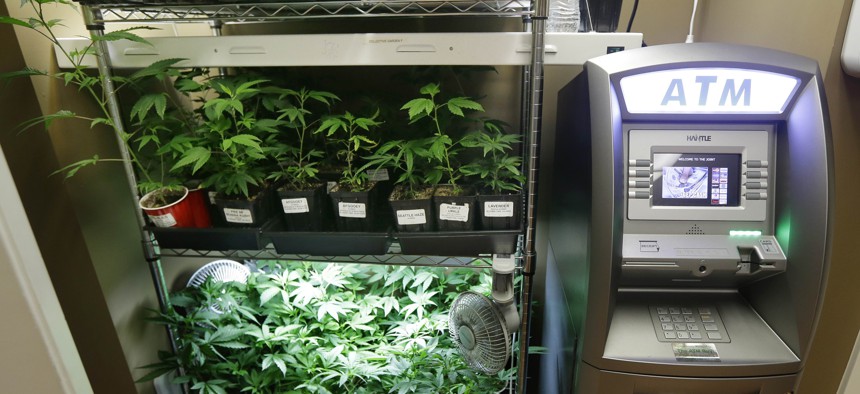States Press Congress on Banking Access For Marijuana Businesses

An ATM sits next to a rack of marijuana clone plants that are used to grow medical marijuana, Wednesday, Oct. 16, 2013, at The Joint, a medical marijuana cooperative in Seattle. AP Photo/Ted S. Warren
The IRS built “cash rooms” to handle collections from the industry.
With billions of dollars now flowing through the nation’s state-regulated marijuana industry each year, treasurers for 17 states are urging Congress to approve legislation to help ensure cannabis businesses following state laws have access to banking services.
The bipartisan group of state officials notes that marijuana is now legal for medical use in 34 states, and for adult recreational use in 10. But few banks and credit unions are serving the cannabis sector. They face legal risks doing so under federal law, which continues to classify marijuana as a dangerous and illegal drug.
As a result, businesses in the industry are handling large sums of cash, raising worries about crime and creating complications for tax and fee payments to states and local governments.
“Without banking services, cannabis businesses are less able to obey the law, pay taxes, and follow state regulations,” the treasurers wrote in an April 30 letter to House and Senate leaders.
“The public safety risks posed by these businesses are easily mitigated through access to banking service providers and keeping the cash off the streets,” they added.
Marijuana sales in Colorado alone in 2017 and 2018 were around $1.5 billion each year.
The issue has certainly been noticed at the U.S. Treasury Department.
Secretary Steven Mnuchin testified before the House Financial Services committee last month that the Internal Revenue Service has built “cash rooms” to take in tax revenues the U.S. government is collecting from marijuana businesses.
In March, the Financial Services Committee approved legislation known as the Secure and Fair Enforcement, or SAFE, Banking Act, which would safeguard banks working with state-legal marijuana businesses against related legal risks.
The bill was authored by two House Democrats from states where recreational marijuana is legal, U.S. Reps. Ed Perlmutter of Colorado and Denny Heck of Washington.
It cleared the committee 45-15, with only Republicans voting against it and 11 GOP lawmakers voting for it. Democrats hold a majority in the chamber. The bill has since been referred to a Judiciary subcommittee. It has a total of 172 co-sponsors, including 20 Republicans.
Sens. Jeff Merkley, an Oregon Democrat, and Cory Gardner, a Colorado Republican, introduced a companion bill in the GOP-controlled Senate. It has 23 other co-sponsors, including five Republicans, and is pending in a committee that oversees banking.
The treasurers who signed onto the April 30 letter are calling on Congress to pass legislation like the SAFE Banking Act.
The bill, in part, would prevent federal banking regulators from penalizing banks and credit unions for providing financial services to marijuana businesses that are operating legally under state laws, or from prohibiting them from offering services to the companies.
It would specifically block federal authorities from terminating or limiting a bank’s federal deposit insurance solely because the bank is working with clients in the marijuana sector.
The bill would also create a “safe harbor” from criminal prosecution and liability and asset forfeiture for banks and their employees who provide financial services to legitimate, state-regulated cannabis businesses, according to Merkley’s office.
Under the legislation, banks are not required to offer their services to pot businesses.
Perlmutter’s office has noted that the legislation has the support of the American Bankers Association, Credit Union National Association, Independent Community Bankers of America and the National Cannabis Industry Association, among other groups.
Mnuchin last month said he didn’t want to comment on what the policy should be for banking access for the marijuana industry and said he would have to review the SAFE Banking Act.
“There is a problem that there is a conflict between the federal law and state law,” he added.
The treasurers who sent the letter on the issue to congressional leaders were from Oregon, Washington, Maine, Hawaii, Nevada, Utah, New Mexico, Michigan, Illinois, Massachusetts, Maryland, Rhode Island, New Jersey, West Virginia, Ohio, Pennsylvania and Colorado.
Bill Lucia is a Senior Reporter for Route Fifty and is based in Olympia, Washington.
NEXT STORY: States Are Allowing Bank Accounts to Link Savings to Prizes. Customers Aren't Biting.






